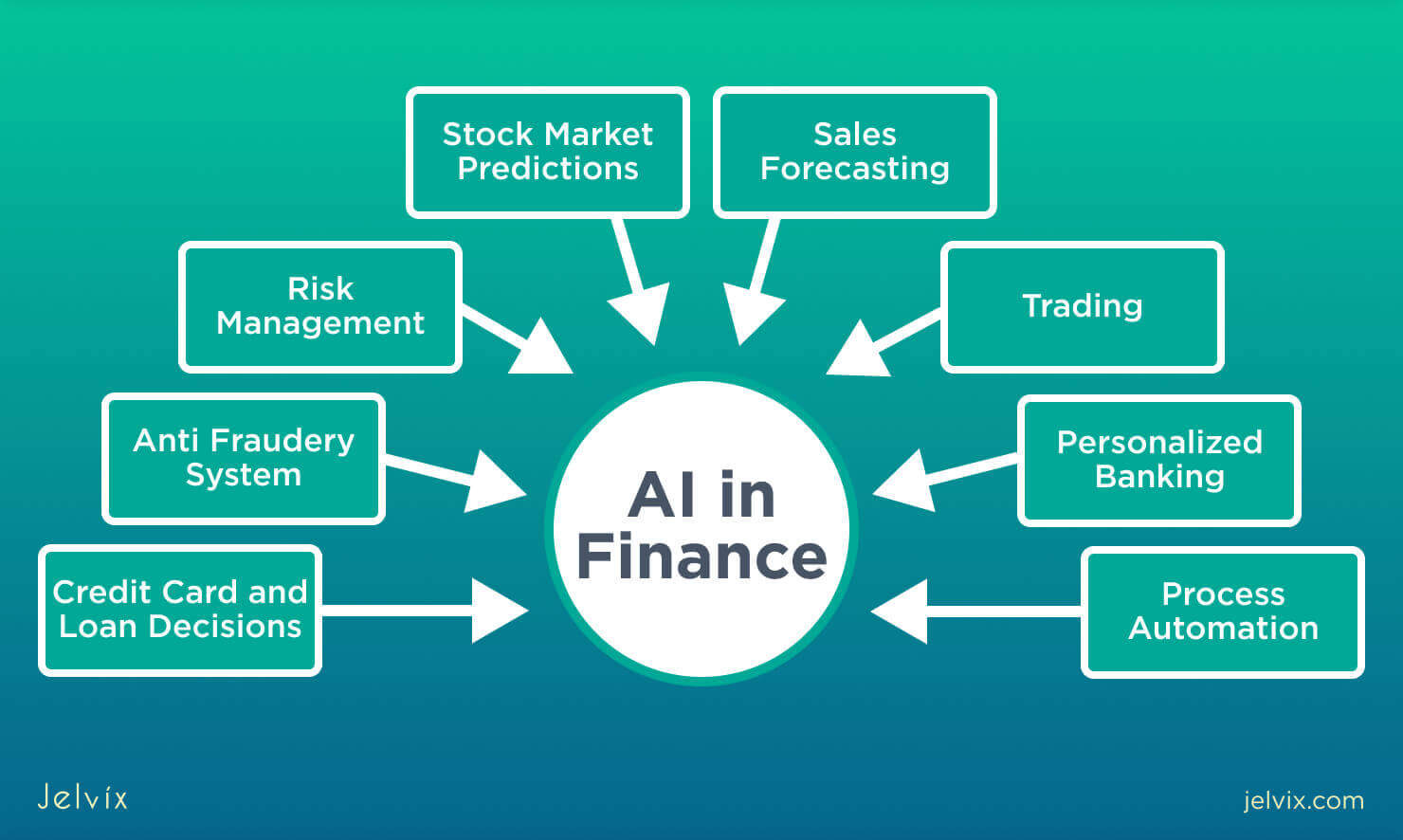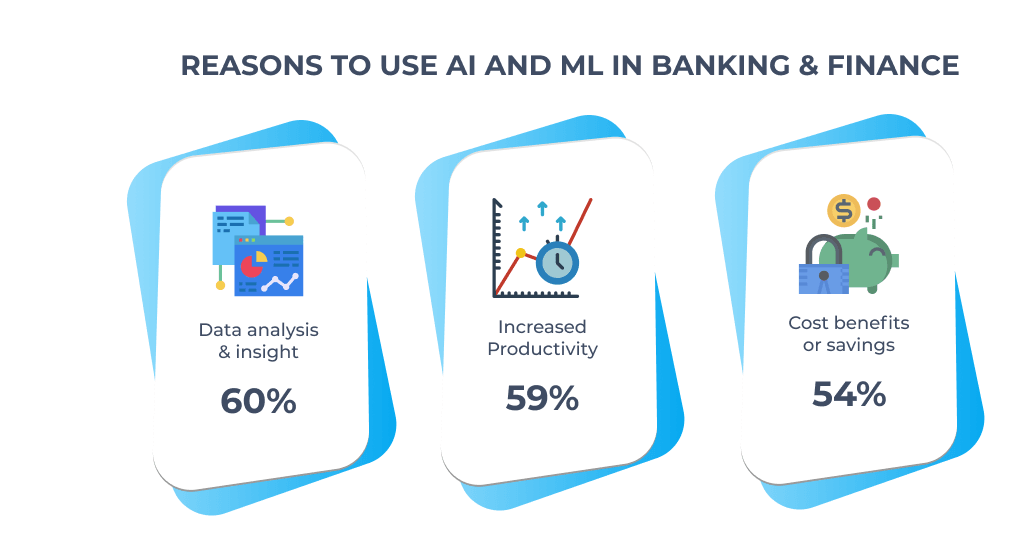 |
| How AI and ML Are Transforming Finance |
AI and ML, short
for Artificial Intelligence and Machine Learning, are transforming the world of
finance. AI is like having a super-smart computer that can learn and make
decisions on its own. It uses vast amounts of data to predict financial trends
and manage risks, making it easier for people to invest wisely and keep their
money safe. ML, its helper, learns from this data, getting even better at
making predictions over time. Together, AI and ML are transforming finance
by providing smart, data-driven solutions for better financial management and
investment decisions. They're like having financial experts at your service,
guiding you toward smarter financial choices.
In this article, you'll discover the remarkable impact of Artificial Intelligence (AI) and Machine Learning (ML) on the world of finance. AI, like a digital financial guru, uses its incredible abilities to analyze massive amounts of data and predict financial trends. It helps individuals and businesses make informed investment decisions while managing risks more effectively and learn How AI and ML Are Transforming Finance and what isAI in finance.
This article delves into the benefits of these technologies, such as improved risk management, 24/7 customer support, and personalized financial advice. It also discusses the future potential of AI and ML in finance, AI and ML Are Transforming Finance, making it a must-read for anyone interested in staying ahead in the rapidly evolving world of financial technology. Whether you're an investor, a financial professional, or simply curious about the future of finance, this article will provide valuable insights into the powerful role AI and ML are playing in shaping the industry.
Data Science AI and ML In Finance
In the realm of finance, where precision, timing, and insights are paramount, data science, artificial intelligence (AI), and machine learning (ML) have emerged as the ultimate game-changers. These technologies have revolutionized the financial industry, redefining the way businesses make decisions, manage risks, and optimize their operations.
 |
| How AI and ML Are Transforming Finance: What Is AI in Finance(image source by jelvix) |
The Financial Revolution Powered by Data Science and AI
To comprehend the
magnitude of this revolution, consider this: according to a study by PwC,
nearly 75% of financial service providers believe that AI will be a
game-changer for their industry. The same study reveals that AI is expected to
contribute over $1 trillion to the global economy through increased
productivity and product innovation.
Here, we explore how
data science, AI, and ML are driving change in finance and how businesses can
harness their potential to maximize profits and foster innovation.
Read more here about a Tch revolution in the world of Finance.
Data-Driven Decision-Making in Finance World
Data science has
bestowed upon financial institutions the power of data-driven decision-making.
In a sector where microseconds can make or break fortunes, access to real-time
data and the ability to analyze it swiftly can make all the difference.
AI algorithms can sift
through mountains of financial data, identifying trends and anomalies that
human analysts might miss. For instance, AI-driven trading systems can process
vast datasets of historical market information, enabling traders to make split-second
decisions based on patterns and correlations. These systems can execute trades
at speeds and frequencies far beyond human capabilities, unlocking once
unimaginable profit opportunities.
Risk Management and Fraud Detection( AI and ML in Finance World)
Risk management is a
core function in finance, and AI and ML have significantly enhanced this
critical area. Machine learning models can analyze historical data to predict
market volatility, assess credit risk, and optimize investment portfolios. This
not only helps investors minimize potential losses but also maximizes returns.
Moreover, AI is a
potent weapon in the battle against fraud. Financial institutions lose billions
of dollars annually to fraudulent activities. AI algorithms can detect
suspicious patterns and transactions in real-time, flagging potential fraud
cases long before they escalate. A report by McKinsey & Company estimates
that AI-powered fraud detection could reduce financial fraud losses by 40%.
 |
| How AI and ML Are Transforming Finance: What Is AI in Finance |
Personalized Financial Services with the AI/ML
AI is also reshaping
how financial services are delivered to customers. Chatbots and virtual
assistants powered by natural language processing (NLP) are becoming
commonplace in customer service. These AI-driven agents can handle routine
inquiries, assist with transactions, and provide financial advice, enhancing
customer experiences while reducing operational costs.
Additionally,
recommendation systems, similar to those used by technology giants like Amazon
and Netflix, are gaining ground in finance. Banks and investment firms employ
recommendation algorithms to suggest personalized financial products, such as
investment opportunities or credit cards, to customers based on their financial
histories and goals. This not only increases cross-selling opportunities but
also enhances customer satisfaction.
 |
| How AI and ML Are Transforming Finance: What Is AI in Finance |
Quantitative Trading and Algorithmic Investments for Finance
Quantitative trading,
driven by complex algorithms and machine learning models, has become a dominant
force in financial markets. These algorithms analyze historical and real-time
data to execute trading strategies automatically. The advantages are clear:
they remove human emotions from trading decisions and can identify
opportunities across multiple markets simultaneously.
High-frequency trading (HFT) is a prime example of AI and ML in action. HFT firms leverage cutting-edge technology to execute trades at blazing speeds, often in microseconds. They use machine learning models to predict market movements, arbitrage price differences, and manage risk in real-time. These strategies have resulted in substantial profits for HFT firms, with some estimates suggesting they account for nearly half of all U.S. equity trading volume.
Maximizing Profits with AI and ML
Now that we've seen
how data science and AI have reshaped finance, the question arises: how can
businesses maximize their profits in this data-driven era? The answer lies in
leveraging these technologies effectively.
1. Investment in AI Infrastructure
To fully harness the
power of AI and ML, financial institutions must invest in robust
infrastructure. This includes high-performance computing clusters, data storage
solutions, and scalable cloud platforms. By ensuring the availability of these
resources, organizations can process vast datasets quickly and run complex machine-learning
models efficiently.
2. Data Quality and Governance
High-quality data is
the lifeblood of AI and ML applications. Financial organizations should focus
on data governance practices, ensuring data accuracy, consistency, and
security. Data cleansing, validation, and monitoring processes should be in
place to maintain data integrity.
3. Talent Acquisition and Training
The demand for data
scientists and AI specialists is on the rise. Financial institutions should
actively recruit and train professionals in these fields. Training existing
employees in data science techniques is also a viable strategy to build
in-house expertise.
4. Regulatory Compliance
The financial industry
is heavily regulated, and AI applications must comply with stringent rules and
standards. It's crucial to integrate compliance into AI development processes
to ensure that algorithms meet legal and ethical requirements.
New Business Ideas in the Age of AI and ML Are Transforming Finance / Data Science
Beyond traditional
financial institutions, there are vast opportunities for entrepreneurs and
startups to leverage AI, ML, and data science. Here are some exciting business
ideas:
1. AI-Driven
Robo-Advisors: Launch a
robo-advisory platform that uses AI algorithms to provide personalized
investment advice and portfolio management for individuals.
2. Alternative
Credit Scoring: Develop an
AI-powered credit scoring system that uses non-traditional data sources, such
as social media and transaction histories, to assess creditworthiness for
underbanked populations.
3. Peer-to-Peer
Lending Platforms: Create a
P2P lending platform that employs AI for risk assessment and automated loan
processing, connecting borrowers with individual or institutional lenders.
4. Insurtech
Innovations: Enter the
insurance technology (insurtech) space by developing AI-driven solutions for
claims processing, fraud detection, and personalized policy recommendations.
5. AI-Powered
Trading Tools: Build
sophisticated trading tools and algorithms that cater to retail investors,
empowering them to make data-driven investment decisions.
Strategies for Success( AI and ML in the Finance World)
Starting and growing a
business in the fields of AI, ML, and data science can be incredibly rewarding
but also challenging. Here are some strategies for success:
1. Niche Focus: Specialize in a specific niche within the
financial industry, such as alternative investments or sustainable finance.
This allows you to become an expert in a particular area and stand out in the
market.
2. Collaboration: Partner with established financial
institutions or technology firms to gain access to resources, data, and
distribution channels.
3. Regulatory
Compliance: Understand and
adhere to financial regulations. Consult legal experts to ensure your
AI-powered solutions meet compliance requirements.
4. Continuous
Learning: Stay updated with
the latest advancements in AI and data science. Attend conferences, webinars,
and training programs to keep your knowledge and skills up-to-date.
5. Ethical
Considerations: Build ethical
AI systems. Transparency, fairness, and responsible data usage are essential
for gaining trust in the financial industry.
Conclusion: Shaping the Future of Finance with AI and Data Science
As we look to the
future, it's evident that data science, artificial intelligence, and machine
learning will continue to be pivotal in shaping the financial landscape. Their
ability to analyze data, optimize processes, and enhance decision-making
positions them as indispensable tools in the industry's toolbox.
Whether you're a
financial institution aiming to maximize profits, an entrepreneur seeking new
business opportunities, or a data scientist passionate about innovation, the
world of finance offers fertile ground for exploration. By embracing AI, ML,
and data science with a commitment to ethics and excellence, we can build a
financial future that's more accessible, efficient, and profitable for all.
The journey is just
beginning. Let's embark on it with open minds and a determination to harness
the full potential of these transformative technologies to revolutionize
finance for generations to come.









.png)

COMMENTS